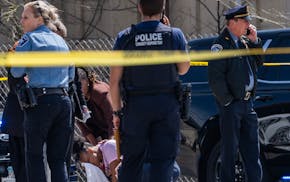Opinion editor's note: Strib Voices publishes a mix of commentary online and in print each day. To contribute, click here.
•••
After 2,000 troops rolled into Los Angeles on Saturday, ostensibly to quell protests over immigration raids across Southern California, Terry Moran, one of America's most respected network journalists, fired off a tweet Sunday calling President Donald Trump and White House Deputy Chief of Staff Stephen Miller "world-class" haters.
Of Trump, Moran tweeted the following:
"His hatred [is] only a means to an end, and that end [is] his own glorification."
Of Miller, Moran tweeted:
"You can see that his hatreds are his spiritual nourishment. […] He eats his hate."
The late-night tweet — apparently triggered by the unorthodox and highly controversial federal troop deployment — was quickly deleted. But screenshots live forever. Moran's pointed criticism earned him a swift suspension from the network, where he has worked for nearly 30 years. It may be some time before we see him back on the air.
The suspension should surprise no one, least of all Moran himself. He isn't paid for commentary. He is paid to report the facts. His tweet, while searing, clearly crossed the line of journalistic neutrality.
But let's be clear: A far more egregious form of vitriolic and dangerous speech is now coming straight from the White House.
The latest round began with Trump's decision to send National Guard troops to America's second-largest city without so much as a courtesy call to California Gov. Gavin Newsom or Los Angeles Mayor Karen Bass. Either through recklessness or deliberate design, Trump's move escalated tensions and undercut local authority. Then, as if starring in his own ICE-enforcement movie trailer, he labeled Newsom and Bass incompetent and suggested Newsom should be arrested for criticizing the military's active presence in his state.
These insults, taunts and threats against elected officials — at a moment of deep social unrest — may not amount to hate speech. But they're certainly reckless rhetoric. And something else Trump said Monday gets us dangerously close to hate speech in the cumulative.
He called the protesters "insurrectionists." (In Trumpian fashion he later walked that back just enough to retain the implication.)
An insurrectionist is anyone who actively seeks to overthrow a government through violence. That's not what's happening on America's streets — not even in Los Angeles, where the federal provocation has triggered the need for an even stronger state reaction.
Curiously, Trump never used that word "insurrection" for the mob that stormed the U.S. Capitol on Jan. 6, 2021, to overturn an election he falsely claimed to have won. Yet he now freely deploys the description to describe protesters because it tees up his real aim: to invoke the 1807 Insurrection Act, giving him sweeping authority to use the military against protesting Americans.
On Monday, California officials announced they intend to sue Trump for bypassing Newsom and commandeering the state's National Guard. That appears to be a battle that Trump welcomes — and even relishes.
Who's next?
At least nine states, including Minnesota, saw anti-ICE rallies or protests this past week. In nearly all cases, but not without exception, the gatherings were peaceful — tense at times, yes, but often marked by confusion created by the clashing mandates of local, state and federal agencies.
Yet the president now seems intent on making ICE immigration raids the centerpiece of his domestic policy. Minnesota should be on notice.
It must be noted that the matters discussed here are part of actively evolving events. On Monday afternoon there were reports that hundreds of Marines were deploying to Los Angeles to protect federal buildings and personnel, but ostensibly not to engage protesters. On the flip side, the robot taxi company Waymo said it was suspending service in Los Angeles and San Francisco after protesters summoned some of its cars and set them ablaze.
In the end, the line between free speech, dangerous rhetoric and hate speech is not just a matter of legal parsing; it's a matter of democratic survival. We are watching that line blur in real time, and the stakes could not be clearer.
Morris: State workers return, St. Paul stirs — but will it stick?


